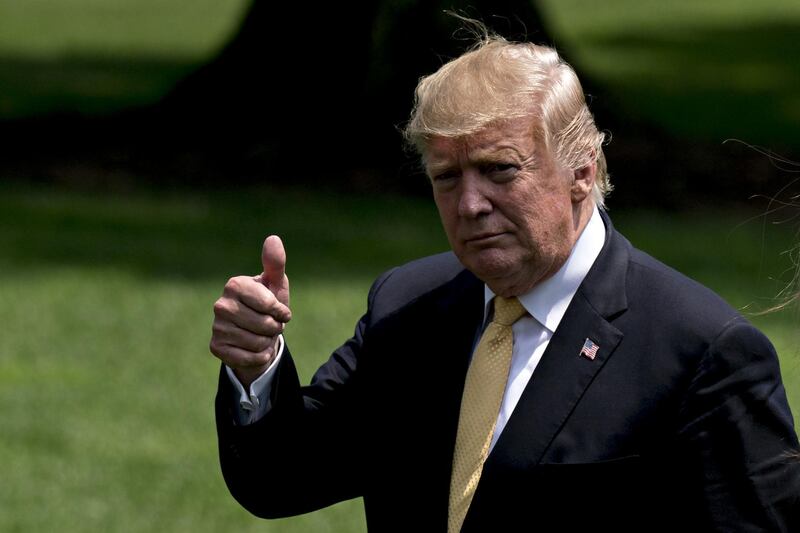Every year, pundits forecast China's inexorable rise to superpower status and the end of the American century, a warning that has seemed ever more prescient since Donald Trump's election as US president.
How then to explain the mostly flattering findings of a study on American democracy conducted by a non-profit organisation called the Eurasia Group Foundation? The inquiry focused on eight countries’ view of the American political system. The questions were couched in the mundane language of public opinion polling but their scope could be seen as more far-reaching.
It seemed as if the study was trying to get to the heart of whether the US, led by the unilateralist Mr Trump, was as attractive at nearly 250 years old as it was in its early years. In its 50th year, the French aristocrat Alexis de Tocqueville toured the young republic and wrote an admiring critique of the bold new American experiment. De Tocqueville's 1831 study Democracy in America has long been influential but do its conclusions on the "greatness and genius of America" still stand?
The Eurasia Group Foundation poll didn’t mention De Tocqueville but its thrust is linked to the effect the young United States had on the Frenchman - or any foreigner, for that matter. It begs the question: does American democracy still leave the wider world in awe? Does it inspire imitation?
For the most part, yes, says the study. The Chinese, Indians, Nigerians, Poles and Brazilians took a generous view of the US political system or at least some of its characteristics. The Japanese and Germans, not so much. Egypt took a mixed view. Twice as many Egyptians liked American ideas of democracy as disliked them. But only about one quarter of Egyptians had a favourable opinion of the US itself.
The fans of American democracy today are an unlikely bunch. There is China: 42.4 per cent had a somewhat favourable view of US democracy. And there is India, the world's largest democracy by the size of its population, of whom 49.8 per cent took a very favourable view of the US system; 36.3 per cent a somewhat favourable one. In Brazil, more than one-third took a very favourable view. Poland was pretty similar, with 39.5 per cent taking a very favourable view. But it was Nigeria, the youngest democracy among the countries surveyed, which was the most admiring of the US, with 55.6 per cent taking a very favourable view and 26.6 per cent a somewhat favourable one.
Might this suggest America is a beacon of sorts for young democracies and for countries such as China that have alternative political systems? And might this explain why respondents in Germany and Japan, countries that are fiercely proud of their own political culture and system, saw little to commend in the US? Only 13.4 per cent of German respondents took a somewhat favourable view and 4.9 per cent a very favourable one of the US. In Japan, as few as 2 per cent held a very favourable opinion. This might seem somewhat surprising because both Germany and Japan have been close allies of the US, despite being adversaries during the Second World War. Additionally, the US contributed substantially to the re-building of what was then West Germany and has promised to be Japan’s chief defender in case of attack since the 1960 Treaty of Mutual Co-operation and Security.
It is the German and Chinese attitude to America’s political system and its perceived influence on the world that might offer the biggest clues to what democracy in America means today, long after De Tocqueville. China’s generally benign opinion might seem odd, considering its trade war and geopolitical rivalry with the US. But the study was conducted last autumn when the Trump administration’s additional tariffs on Chinese imports had just come into effect.
At the time, China adopted a pragmatic, long-term view. A similar study today might elicit different answers - but perhaps not substantially so. The Chinese would probably still say, as they did in the study, that the US should “focus on the flaws in its own political system instead of focusing on the political systems of other countries”. And they might still express admiration for American democracy.
As for Germany, its view of the US is deeply tied in with disapproval of Mr Trump’s leadership, as well as the federal government’s refusal to do much about climate change or lessen income inequality within the country.
Interestingly, the main takeaway from the study is the extent to which disparate countries see the continuing possibilities for change and renewal in the American system. In this, the world’s view remains at one with De Tocqueville, who wrote that the greatness of America lies not in being more enlightened than any other nation, but rather in her ability to repair her faults.





